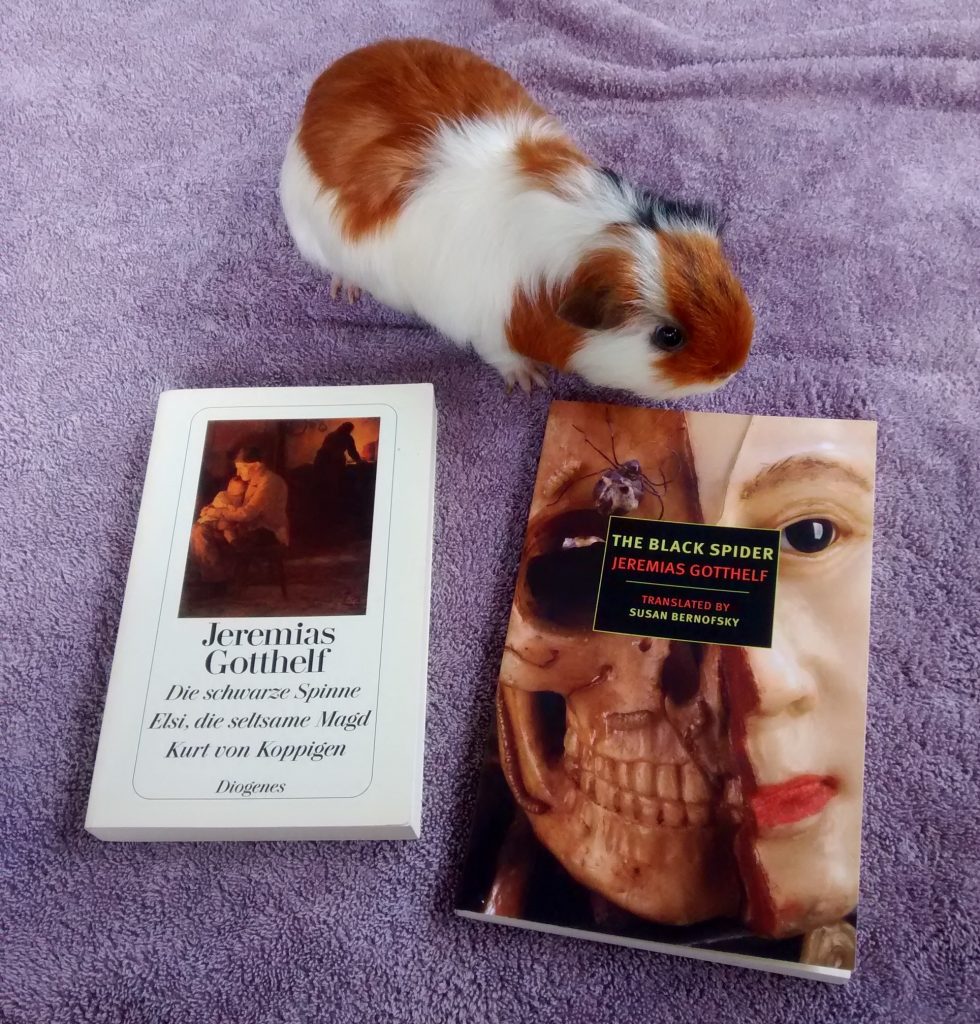And why not do evil that good may come? – as some people slanderously charge us with saying. Their condemnation is just. (Romans 3:8)
Die schwarze Spinne is an unsettling tale that dramatizes the terrible consequences of moral cowardice. The author, Swiss pastor Albert Bitzius (1797-1854), wrote under the pious pen name of Jeremias Gotthelf.
I’d been meaning to read it for a while – to be honest, ever since I bought it at a bookstore in Bern 15 years ago – and finally got around to it thanks to the New York Review of Books sale, which was offering Susan Bernofsky’s English translation. I read it side-by-side with the original, which means that I let her do the heavy lifting where nineteenth-century Swiss peasant vocab was concerned, but also that I can assure you her translation is both accurate and well-written. English-speaking readers will have no trouble getting caught up in the action – it doesn’t have that stilted, “translated” feel.

It gets off to a slow start, with a framing story about some hardy Emmental folk celebrating a baptism. This portrait of a well-ordered society provides an essential foil to the central tale of horror, in which medieval peasants, desperate to fulfill their brutal landlord’s impossible demands, make a deal with the devil – hoping, as always, to avoid paying the price, which in this case is an unbaptized baby.
But the payment comes due and most of them resign themselves, callously calculating the value of one life compared to the whole community, or the insignificance of their individual contribution to the crime.
What they end up with after a few turns of the plot is a plague of spiders from Hell. The arachnid host eventually conglomerates into one giant, glowering embodiment of evil that terrorizes the villagers, killing more of them each day with its fiery bite. It might just be possible to capture the spider and trap it somewhere, but anyone brave enough to do so is certain to die in the process.
The mood and details of this part of the story feel more like a channeled nightmare than a consciously planned novel. Sometimes it also has the wild exuberance of a scary story invented by a child: like the part where a knight is riding around looking for the spider, people are screaming and running from him in all directions because in fact the spider is on his head; in the chaos he and his horse tumble over a cliff and finally the spider’s feet burn through his helmet and into his brain.
The spider is a perfect metaphor. It starts out as millions of tiny things and turns into one big thing. It seems to be everywhere and nowhere. You never know when it will jump on your face or run across your foot. You’re not safe in your home, and certainly not safe while sleeping. It’s the Black Death. It’s the evil lurking in everyone’s heart. It’s the knowledge that your neighbors might rat you out to the secret police and tomorrow you could be in Room 101.
This is why the part I found most unsettling was the coda to the horror story: the spider has been sealed up for generations (and it’s noteworthy that the spider can’t be eliminated – only confined). Everyone knows where it is, but it can’t be seen…and reckless young people start fooling around with it, flinging food at the door of its prison, prying around it with knives, joking about letting it out.
At this moment in history, which feels like a pivotal time where anything could happen, how many of us are taunting the spider? Prying at that door “ironically”? Wondering if it’s really that bad or if it’s even there at all? The spider hears you. It’s purring. Walk away.
Never heard of this book or the author, so this was an interesting read.
The spider story sounds like a variation on Pandora’s Box.